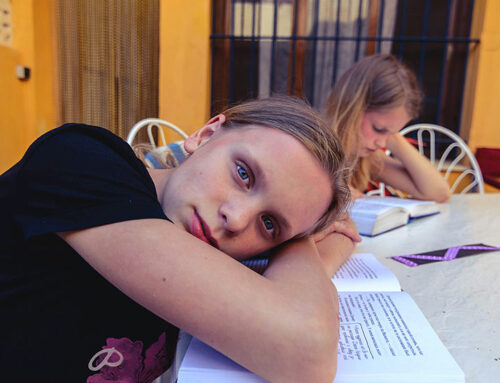Summer break = fun, right?
For many children summer brings sunshine, playtime, and a break from homework. But for others, the sudden loss of structure and predictable routines can create a sense of restlessness, anxiety, and even behavioral challenges. For parents, this shift can feel like a rollercoaster of moods, energy bursts, and screen-time battles.
The good news? Children thrive on rhythm. A calm, consistent daily flow—without the rigidity of the school year—can help kids feel safe, grounded, and supported through the summer months. Whether your child is naturally adaptable or more sensitive to change, these psychologist-approved tips can support their mental health and help your family enjoy a more balanced summer.
- Keep a Rhythm (Not a Schedule)
While some parents may try to replace school hours with activity-packed calendars, it’s often more effective to focus on rhythm rather than a strict schedule. Consistent wake-up times, meals, and bedtimes give children a sense of predictability—which reduces anxiety and supports emotional regulation.
Dr. Lisa Damour, psychologist and bestselling author, emphasizes that structure “communicates to children that the adults in their lives are in control,” which in turn helps kids feel secure.
Try this:
- Keep wake-up and bedtime within an hour of the school year routine.
- Anchor the day around regular meals, brushing teeth, and screen-free winding-down time.
- Create Daily “Anchors”
Without the natural structure of school bells and transitions, many kids benefit from “anchor points” in their day. These are simple, recurring moments that offer comfort and predictability.
Examples include:
- Reading together after lunch.
- Taking a family walk after dinner.
- Quiet coloring or journaling time mid-morning.
- A short stretch or mindfulness break each afternoon.
These calming routines offer built-in emotional “checkpoints” where kids can reset—especially helpful for children with sensory or attention challenges.
As the Child Mind Institute explains, daily rituals give kids a sense of mastery over their environment and reduce emotional overwhelm.
- Support Emotional Expression (Yes, Even Boredom)
Children often struggle to name their feelings, especially during transitions or downtimes. Summer break can bring frustration, boredom, or anxiety to the surface especially if kids miss friends or feel a lack of stimulation.
Instead of dismissing complaints like “I’m bored” or “This day is dumb,” try using these as emotional entry points. Name what you observe (“Sounds like you’re feeling frustrated that there’s nothing planned”) and offer tools to help.
Support strategies:
- Use a mood chart to help younger kids label emotions visually.
- Encourage a “feelings journal” for tweens or teens.
- Offer calm-down spaces or sensory-friendly activities for when emotions feel big.
Remember: validating a child’s emotions helps build emotional intelligence and resilience. As clinical psychologist Dr. Mona Delahooke reminds us, “Connection is more important than correction”.
- Balance Screen Time with Real-World Play
Let’s be honest—screens are part of summer. And that’s okay. But when screen time dominates, kids may miss out on important brain-building and body-regulating experiences like outdoor play, creative exploration, and rest.
The American Academy of Pediatrics encourages families to create a media plan that includes device-free times and locations (like meals or bedrooms) and ensures children have ample opportunity for unstructured, screen-free activities.
Try this:
- Set screen “zones”—maybe mornings are tech-free and devices come out after lunch.
- Balance each hour of screen time with outdoor movement or creative play.
- Use timers or visual schedules to give kids control over transitions.
- Embrace Downtime—It’s Brain Food
Here’s something reassuring: Kids don’t need constant entertainment. In fact, a little boredom is not only normal it’s beneficial. Unstructured time gives the brain space to rest, dream, and imagine.
Research shows that downtime supports:
- Executive function (planning and problem-solving)
- Creativity
- Self-regulation
- Autonomous play, which builds confidence.
Rather than rushing to fill every moment, give your child time and space to be alone with their thoughts. A bored brain will eventually start building.
Encourage:
- Open-ended toys (blocks, art supplies, nature tools)
- “Quiet corners” for books, drawing, or music
- Creative time where anything goes—as long as it’s screen-free
Making the Most of Summer—With Support
Every child is different. Some crave adventure, while others need quiet predictability. If your child is struggling with emotional ups and downs this summer, it’s not a reflection of your parenting it’s a sign they might need some extra support and structure.
At 360 Pediatric Psychology in Lake Oswego, we specialize in helping children and families navigate emotional, behavioral, and developmental challenges with care and evidence-based strategies. Whether you’re looking for guidance, assessment, or ongoing therapy, we’re here to help your child thrive year-round.
Learn more or schedule a consultation at 360pediatricpsychology.com






